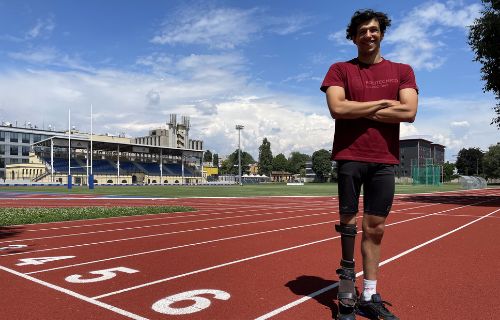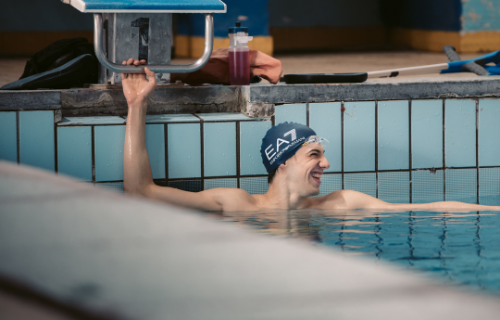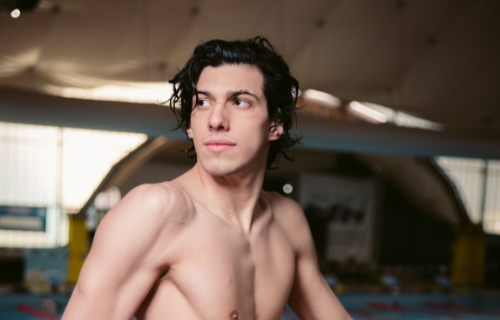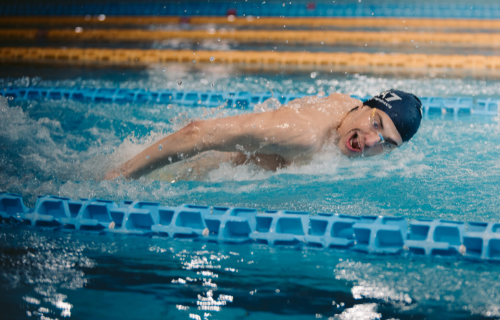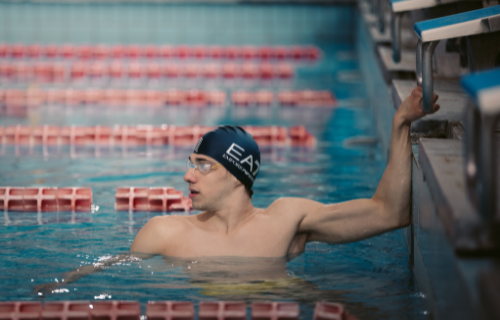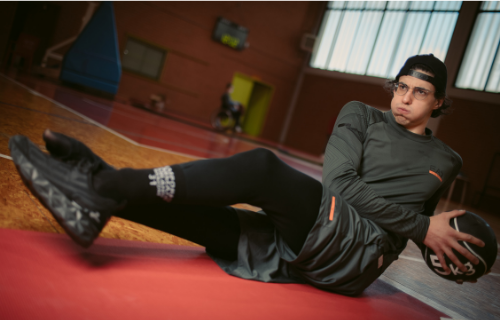Atleti Polimi - Simone Barlaam
Interview with the Paralympic swimming champion, mechanical engineering student at the Politecnico di Milano
Simone Barlaam is a mechanical engineering student at the Politecnico di Milano and a Paralympic swimming champion; in the next few days he will participate in the Tokyo Paralympics (24 August-5 September).
Born with a congenital short femur, fractured at birth, he has undergone twelve surgeries over the years. These circumstances did not prevent him from coming into contact with water from the very first months of life, where he learned to swim at an early age.
At only 21 years of age, he has already won the world champion title seven times, the European champion title eight times, and holds several world records: 50m and 100m freestyle, 50m and 100m backstroke and 50m dolphin class S9. Twice awarded the Collare d'Oro for sporting merit, in 2019 he received the Ambrogino d'Oro from the City of Milan, the Gazzetta Sports Awards as the best Italian Paralympic athlete and was included by Gianni Mura among the 100 names of the year to remember.
How do you reconcile your sporting and university careers? We asked him a few questions to try to understand him and get to know him better.
Hi Simone! How did your passion for swimming come about?
I have always quite intuitively enjoyed the feeling of being in the water. Because of my physical condition, especially when I was a child, water was the only place where I could be active without risking breaking my femur, which at the time was as fragile as crystal. Which, unfortunately, has happened a few times on dry land. It was a short step from swimming school to competitive swimming, then in 2015 I entered the world of Paralympic sport, and here we are today!
A path peppered with sporting successes, achieved in such a short time. Which do you consider to have been the biggest?
It's still to come! [laughs] Joking aside, even though it's not really sporting, my biggest success is seeing little boys and girls with disabilities start to accept themselves for who they are through what I do. This is very gratifying.
Of all the races you've faced, which one has excited you the most?
Certainly one of the races I remember most was my first world gold at the World Championships in Mexico City in 2017, which I dedicated to my paternal grandfather Gigi, who unfortunately passed away a few days before the start of the competition.
What does sport mean to you? Do you think it has taught you something in other areas of life as well?
Sport for me is a passion that has gradually evolved into a semi-profession, if you can call it that. It taught me a lot and shaped my character as I grew up. Sport has reinforced values that I had already learned from my family such as resilience, understanding, patience, respect for others and so on.
Why did you choose to study Engineering? Why the Politecnico di Milano?
Engineering is the school that most closely meets my interests. I chose the Politecnico because to have such world-class excellence around the corner and not “exploit” it would be sheer madness.
Sport and study are very demanding. How do you reconcile these two worlds?
With a lot of dedication, many sacrifices and trying to make the most of every minute.
Ironically, in this last academic year the controversial DAD helped me a lot. In fact, whenever a lesson coincided with one of my training sessions I was able to simply catch up shortly afterwards by watching the recording.
Did the Dual Career programme also help you?
Certainly. It helped me by allowing me to better organise my study plan and to move exams that happened to coincide with international competitions. Besides, although it is not in my case, if my course had had compulsory attendance, through the Dual Career programme it would have been waived, allowing me not to sacrifice training and proceed with these in parallel.
What advice would you give to an athlete who doesn't know whether or not to enrol in university?
I would definitely say sign up for it without too much pressure.
Education and the opportunity to study are privileges we have that we are not even aware of. In addition, an athlete's career ends fairly early, which is why I consider it so important to have a parallel and alternative life to sport.
I would like to reiterate: without too much pressure. Because university life is already very stressful, and if you add to that the life of a professional athlete, the risk of becoming overstretched is very high. Taking a few years longer is not a tragedy. The important thing is to learn, grow and enjoy the experience and learn from it.
What are your passions apart from sport and study? And above all, can you also find time for your private life?
These days, unfortunately, not so much. But usually - Covid permitting - getting together with my family or friends is one of my favourite things in life.
Besides sport, I love drawing and art in general. I love experimenting with new techniques using innovative materials. I also really enjoy reading and editing videos on the PC.
Politecnico also means Milan. What do you like about this city?
Speaking about the historic centre and its monuments would be a no-brainer. I really like the sense of community that you feel, and the fact that it is a city that is alive and full of things to do, places to go and stimuli to be found.
What are your goals and dreams, sporting or otherwise, for the future?
Graduating from university is definitely one of my main goals. The sporting ones, however [smiles], I prefer to keep them to myself.
To find out about the Dual Career programme, which helps our students who practise sport at the highest level to pursue both their sporting and educational activities with confidence and success, visit the Polimi Sport website.


